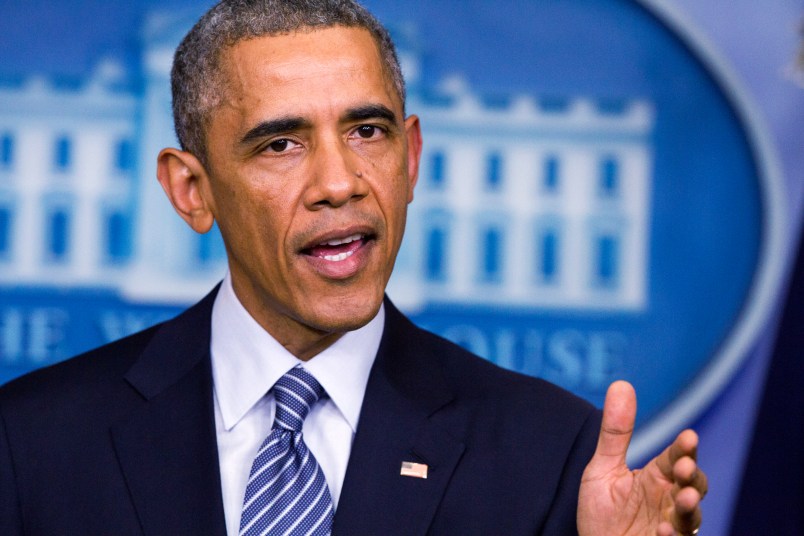Impeachment has faded in Republican circles as an option to punish President Barack Obama over his sweeping executive actions to reshape immigration enforcement, ruled out even by hardliners like Rep. Steve King (R-IA) who are livid with the president and want to retaliate.
An alternative that has gained some traction among Republicans is to “censure” the president. The idea has been endorsed by King and Rep. Raul Labrador, both influential GOP voices on immigration issues. National Review writer John Fund has been pushing it for months.
“I think we should censure the president of the United States,” Labrador said on CBS, days after Obama announced his actions. “I think it’s unfortunate that he did this, I think we need to lay out clearly why this is unlawful.”
Republican House leaders have been mum on how they’ll respond to Obama, and are waiting to gauge the level of enthusiasm for a censure vote on Tuesday during their first full conference meeting since the president announced his actions.
The “censure” strategy has much of the bombast of impeachment — a formal vehicle for Republicans to vent their disapproval of Obama, and throw red meat to the conservative base — without the risks of a politically nuclear confrontation that could backfire on them (not to mention, a guaranteed failure to obtain the two-thirds majority required in the Senate to remove the president from office).
But there’s one big problem with this plan: censuring the president might be unconstitutional. Or at least, any censure resolution that would meaningfully punish the president risks violating the Constitution, legal experts say.
“If you can put together in the abstract a resolution that does nothing more than express disapproval, I think it’s possible for Congress to do that. But you can’t do more than that,” said Michael J. Gerhardt, a law professor at the University of North Carolina, who has written a law review article exploring the issue. “I think any impact beyond expression would pose a constitutional problem for the attempted censure.”
Harvard law professor Laurence Tribe said a congressional resolution to censure a president is not clearly authorized by the Constitution, “so a strict constitutionalist would say that it’s an action beyond the authority of Congress.”

House Speaker John Boehner and Senate Minority Leader Mitch McConnell (AP Photo/J. Scott Applewhite)
The censure power has traditionally been used by Congress to reprimand one of its own members for misconduct, most famously Sen. Joe McCarthy (R-WI) in 1954. The legal problem with one co-equal branch of government censuring another is that the Constitution prohibits Congress from punishing anyone outside its ranks without a trial — termed a “bill of attainder.”
“[A] censure resolution is obviously punitive both in purpose and in effect and would thus appear to constitute a kind of ‘trial by legislature” outside the ambit of impeachment and accordingly might be deemed a ‘Bill of Attainder’ forbidden by Article I, §9, Clause 3,” Tribe said in an email.
There’s one way a censure vote that punishes the president may be legal, though it’s unlikely to occur. John Hart Ely, a leading scholar on the bill of attainder clause, who died in 2003, told the New York Times during the Clinton impeachment debate that “the Constitution would go unoffended” if a censure resolution were part of a deal that the president agreed to. In that case, it could not be challenged in court, he said.
There is scant precedent for the act. Just one U.S. president, Andrew Jackson, has been formally censured by a chamber of Congress, in 1834 — that move was expunged three years later. The idea first came up when Congress attempted to censure George Washington’s treasury secretary, Alexander Hamilton, but fell short on votes. It last surfaced during Bill Clinton’s presidency, when there was talk of censuring and fining Clinton to cover the cost of the investigation into the Monica Lewinsky scandal. The Republican-controlled House impeached him instead.
“Censure comes up as a possible alternative to impeachment. But then the question comes up, what does censure get you that simply denouncing the president in a news conference doesn’t get you?” Gerhardt said. “Because when you move that extra step to sanction or constrain him, it’s pretty clear that impeachment is the way to do that.”
The practical problem with a censure resolution against Obama is it probably cannot pass Congress. It needs a majority in the House, which is plausible, but it is subject to a filibuster in the Senate, requiring 60 votes to ensure passage. (Republicans will have 54 Senate seats come January if they win the Louisiana runoff this Saturday.) One senior Senate GOP aide expressed doubt that a censure resolution would be taken up. A House Republican leadership aide would not discuss it on the record prior to the Tuesday conference meeting.
Tribe said that if Congress moves to censure Obama, “that speaks volumes about the depths to which that once great institution has sadly sunk.”







GOP I see you have “painteh thine self into a corner”.ROFLMAOAY
The president should censor or condemn congress right back. Each branch of government is equal. If one can censure, then they all can.
And even if the GOP could some way to thread the needle on this, keeping it constitutional, getting it past a Senate filibuster, and make it sting, their base still wouldn’t be happy. They’ve got too much hatred and anger invested in impeachment to accept anything short of it.
Every minute and every dollar spent chasing the president will be counted against them when it’s time to elect the next Democratic president.
Dear Democrats:
When you control Congress again, do us all a favor and hammer these bastards. If you can’t, get out of the way so that activist Democrats and liberals can sit in your seats. Trust me, there are more than a few rank and file Democrats who would love to knock some Republicans into the dirt and then rub their faces in it.